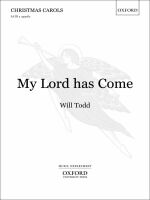Anne of the Waves

Composer: John Rutter
Product code:
B0478
Publisher: Brixton Publications
£12.00
Description
Anne of the Waves (2018) for solo flute by Howard J. Buss was commissioned by Paul McReynolds for Anne Marie McReynolds. The 3 movements, From the Waves, Dreaming, and Glistening, explore a wide array of moods and sonic atmospheres ranging from the mystical, to the contemplative, to soaring, vibrant passages. A common rhythmic thread in the musical tapestry is adaptation of “Anne of the Waves” as expressed in Morse Code. The use of code refers to the fact that both Anne and Paul McReynolds are airplane pilots. Morse Code is still used today in aviation. The rhythms in the music derived from code appear in a variety of contexts, such as sections in a lilting 6/8, a flowing waltz, and in a more abstract, sparkling way in the final movement. Musically, the rhythms resulting from its use serve as a unifying factor throughout.
Look Inside
Description
Anne of the Waves (2018) for solo flute by Howard J. Buss was commissioned by Paul McReynolds for Anne Marie McReynolds. The 3 movements, From the Waves, Dreaming, and Glistening, explore a wide array of moods and sonic atmospheres ranging from the mystical, to the contemplative, to soaring, vibrant passages. A common rhythmic thread in the musical tapestry is adaptation of “Anne of the Waves” as expressed in Morse Code. The use of code refers to the fact that both Anne and Paul McReynolds are airplane pilots. Morse Code is still used today in aviation. The rhythms in the music derived from code appear in a variety of contexts, such as sections in a lilting 6/8, a flowing waltz, and in a more abstract, sparkling way in the final movement. Musically, the rhythms resulting from its use serve as a unifying factor throughout.



